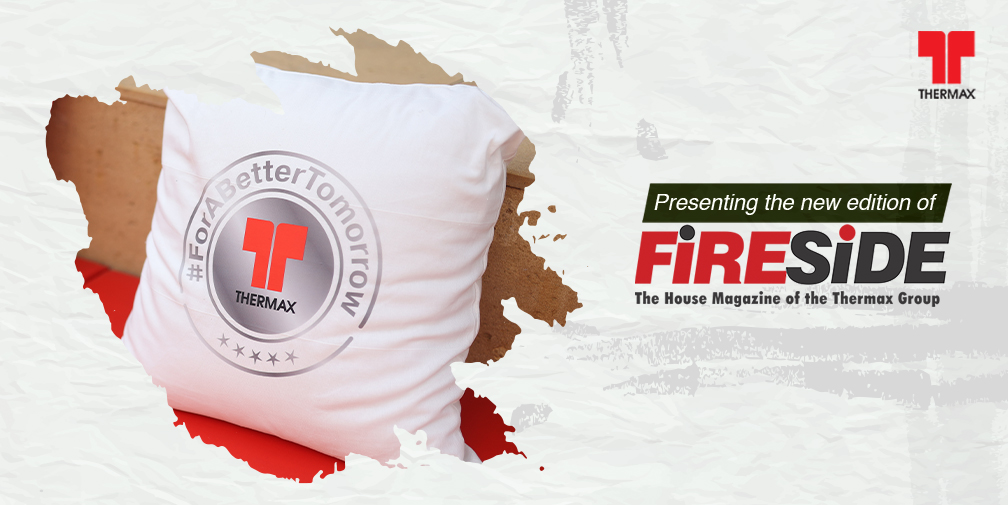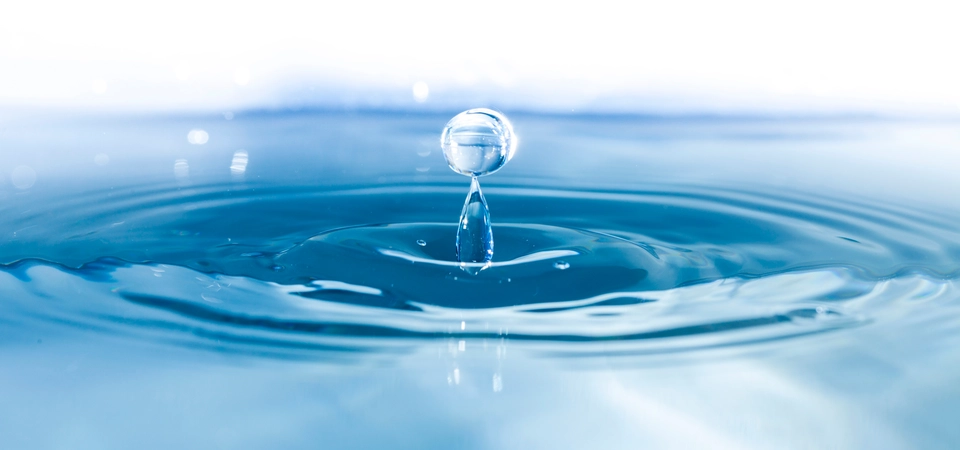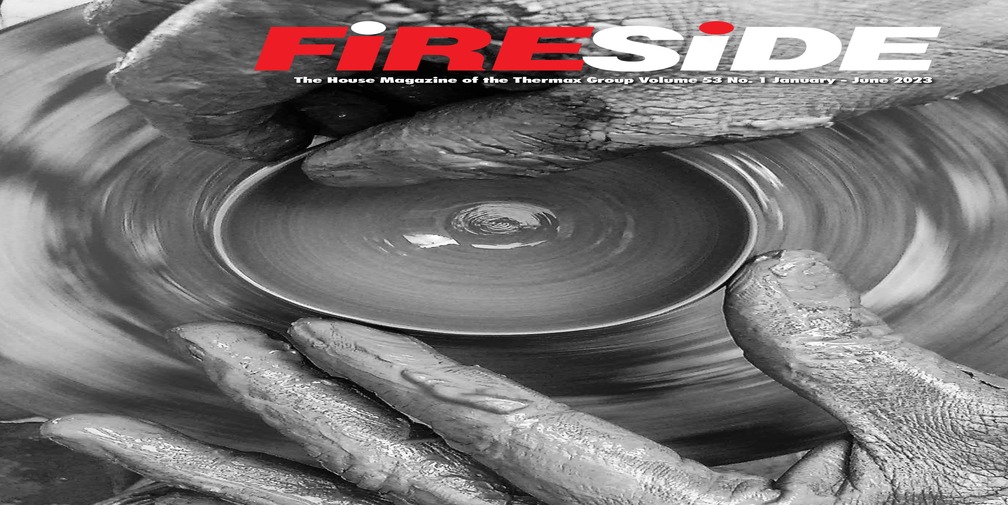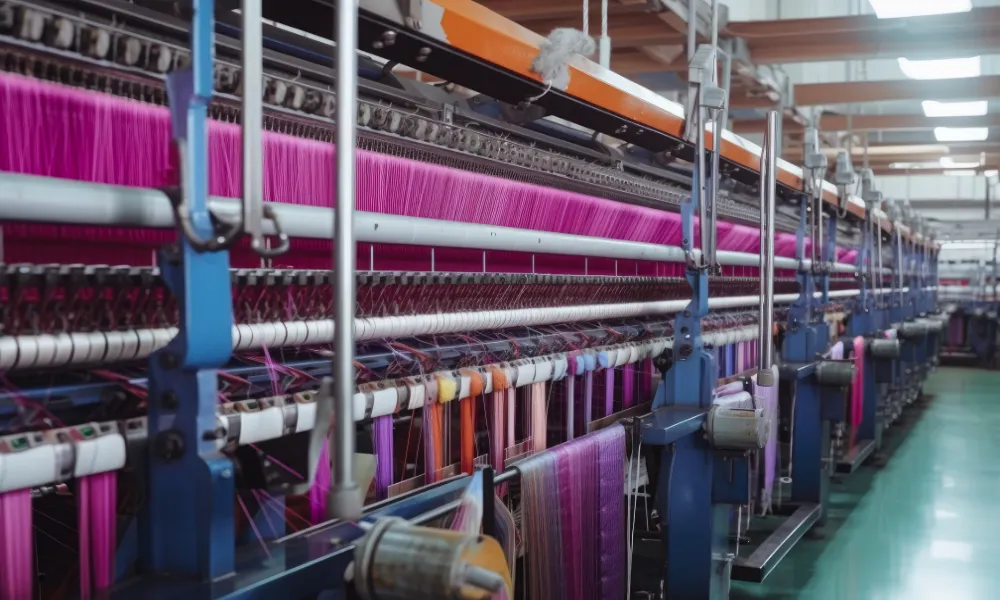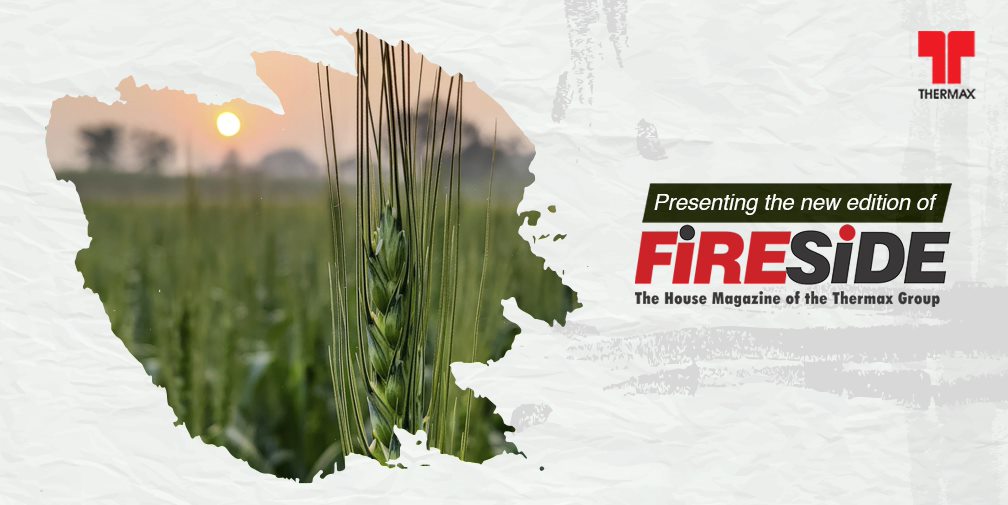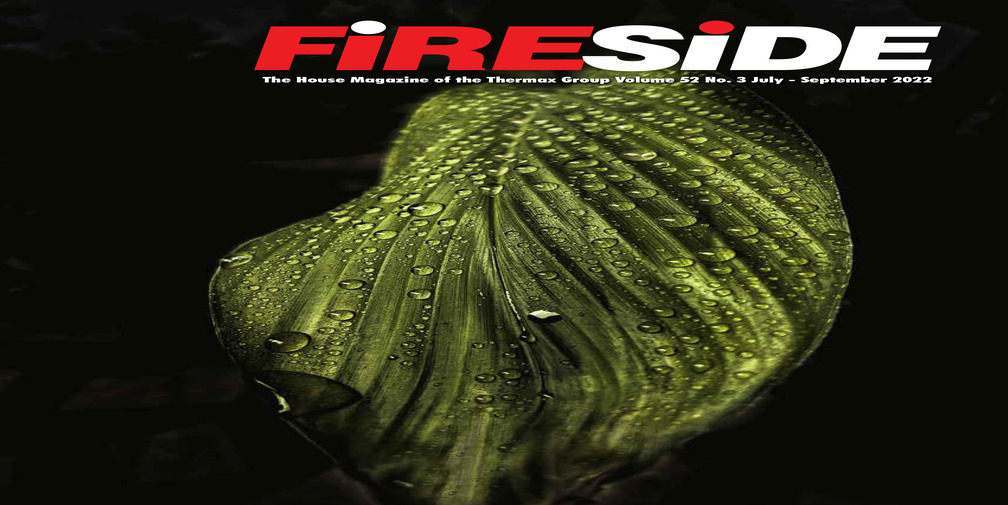Author: Thermaxqaz
Fireside issue
Enhancing Industrial Water Treatment with Thermax Tulsion® Resins
In the realm of industrial processes, the quality of water plays a pivotal role in ensuring efficient perations and product quality. Water treatment in industrial settings is not merely an auxiliary process; it’s a fundamental necessity. This is where Thermax’s industrial water treatment resins come into play, revolutionising the way industries manage their water resources.
Industrial Water Treatment :
Water serves as the lifeblood of various industrial sectors, aiding in steam generation, cooling, cleaning, and forming a vital ingredient in numerous products. However, the water available for these processes often contains impurities like dissolved salts, organic compounds, heavy metals, and contaminants that can lead to corrosion, scaling, fouling, and operational disruptions.
Thermax’s Commitment to Quality :
Thermax, a global leader offering sustainable solutions in the energy and environment domain, recognises the pivotal role high-quality water plays in industrial processes. Armed with decades of expertise, the company has developed an extensive range of industrial water treatment resins designed to address a wide spectrum of water treatment challenges.
Key Features of Thermax’s Industrial Water Treatment Resins:
- Versatility : Thermax offers a diverse range of resins suitable for a multitude of industrial applications, from boiler feedwater treatment to demineralisation and softening.
- Efficiency: These resins are engineered to maximise ion exchange capacity, ensuring the efficient removal of impurities from water.
- Durability : Thermax resins are built to endure, provide long-term, reliable performance in demanding industrial environments.
- Cost-Effectiveness: By enhancing water quality and reducing the frequency of system maintenance, Thermax’s resins help industries save on operational costs.
- Environmental Responsibility : Thermax is committed to sustainability, and their resins are designed with a focus on minimising waste and environmental impact.
Thermax’s industrial water treatment resins are indispensable in numerous industrial applications:
Industrial Softening :
Thermax’s industrial water treatment resins are particularly valuable for industrial softening. In many industries, such as those relying on boilers, cooling towers, and heating systems, the presence of hardness ions like calcium and magnesium can lead to scaling and reduced equipment efficiency.
Thermax’s resin-based softening solutions effectively remove these hardness ions, ensuring that water is softened to meet the specific requirements of industrial processes. This not only enhances operational efficiency but also prolongs the lifespan of equipment.
Demineralisation :
In industries where ultra-pure water is essential, such as pharmaceuticals and electronics, demineralisation is crucial. Thermax’s industrial water treatment resins excel in demineralisation by efficiently removing both cations (positively charged ions) and anions (negatively charged ions) from water. This results in exceptionally pure water, free from impurities that could compromise sensitive
processes and products. Whether it’s for pharmaceutical-grade water or electronics manufacturing, Thermax’s demineralisation solutions set the standard for purity.
De-alkalisation :
For processes requiring low alkalinity levels, such as certain chemical manufacturing and food processing applications, Thermax’s de-alkalisation resins play a vital role. Elevated alkalinity levels in water can adversely affect chemical reactions and product quality. Thermax’s de-alkalisation resins
effectively reduce alkalinity, ensuring that water is tailored to meet the specific requirements of these processes. This precision in water quality control is crucial for industries that demand the utmost accuracy..
Mixed Bed Resins :
Mixed bed resins, combining cation and anion exchange resins in a single unit, are the ultimate solution for achieving the highest water purity levels. They are extensively used in industries like power generation, semiconductor manufacturing, and laboratories where the strictest water quality standards must be met. Thermax’s mixed bed resins provide the highest degree of demineralisation, ensuring water is virtually free from all ionic contaminants. This level of purity is essential for applications where even minute amounts of impurities can have a significant impact. Incorporating these specialised resins into your industrial water treatment processes underscores Thermax’s dedication to providing tailored solutions for specific industrial needs. From preventing scaling and enhancing equipment efficiency through softening to delivering ultrapure water for critical applications like pharmaceuticals and electronics, Thermax’s industrial water treatment resins are a trusted choice for industries worldwide. These resins not only meet but often exceed the stringent standards required for industrial water treatment, making them an indispensable part of modern industrial processes.
Applications across Industries :
Thermax’s industrial water treatment resins find applications across a wide range of industries:
- Power Generation : They help ensure the efficient and reliable operation of power plants by providing high-purity water for boilers and cooling systems.
- Chemical Processing : Thermax resins play a crucial role in maintaining the quality of chemical products and protecting equipment from corrosion.
- Food and Beverages : Water quality is paramount in food and beverage production, and Thermax’s food grade and NSF certified resins help meet stringent quality standards.
- Pharmaceuticals : These resins are used to produce high-purity water for pharmaceutical manufacturing, where product integrity is non-negotiable.
- Textiles : They contribute to efficient dyeing and finishing processes and water recycling by treating textiles for colour removal in the textile industry.
- Automotive : Water quality is vital in automotive manufacturing, and Thermax resins ensure that water meets the required specifications.
- Mining : Industries reliant on water in mining operations benefit from improved water quality and reduced environmental impact. Thermax provides chelating resins for the treatment of tailings to remove the residual impurities and recover precious metals.
- Petrochemicals : Thermax water treatment resins help protect equipment by producing high-purity water, and also Tulsion polymeric catalyst is used in the production of octane boosters, helping maintain product quality in the petrochemical industry.
In a world where water scarcity and environmental concerns are becoming increasingly pressing issues, Thermax stays committed to providing sustainable and efficient water treatment solutions. Thermax’s industrial water treatment resins are not just products; they are enablers of cleaner, more efficient, and
more responsible industrial processes. As industries strive to meet higher standards of quality, efficiency, and sustainability, Thermax’s industrial water treatment resins stand as a beacon of innovation and reliability, supporting them every step of the way.
To explore the full range of Thermax’s industrial water treatment resins and discover how they can transform your industrial processes, visit Thermax’s Industrial water treatment resins page –
https://www.thermaxglobal.com/chemicals/industrial-water-treatment-resins/
Fireside issue
Navigating Energy Transition: Comprehensive Solutions for Textile Players in the Pursuit of Sustainability
In the vibrant tapestry of India’s economy, the textile industry emerges as a potent force, weaving not just fabric but also millions of livelihoods. More so, India has a 4% share of the global trade in textiles and apparel. Yet, amidst this growth, there is a silent concern – the conventional methods and materials integral to the textile processes that often impact the environment negatively.
From dyeing practices to energy-intensive operations like spinning and weaving, the industry’s ecological footprint demands reconsideration. As India progresses on its sustainable endeavours, it is a rallying call for textile players to steer their course towards cleaner, more responsible technologies. Thermax stands poised to facilitate this transformation with its repertoire of solutions, services, and custom-tailored innovations designed to steer the textile sector towards a greener future.
At the heart of textile manufacturing lies the heating systems, historically based on fossil fuels, emanating emissions that corrode the environment. Thermax offers a spectrum of heating solutions that empower textile manufacturers to adopt renewable energy alternatives viz. renewable power, biomass, waste-to-energy, and innovative waste heat recovery. These solutions can lead to lower emissions and a more environmentally friendly approach.
Consider the case of a textile manufacturing facility in Pune, Maharashtra grappling with the dual burdens of high energy costs and excessive carbon emissions due to oil consumption. Thermax Onsite Energy Solutions Limited (TOESL) stepped in offering a biomass-fired boiler, introducing the ‘Build-Own-Operate’ model. The result was a remarkable reduction in operational costs, lowered carbon footprint, and a steadfast boiler performance – a notable achievement towards sustainability without any upfront investment.
Thermax’s impact does not halt within borders. Thermax’s steam fired vapour chillers provide cooling to an aged textile plant in Bangladesh. Understanding that energy significantly affects operational expenses, Thermax conducts energy audits to analyse consumption patterns. These audits uncover inefficiencies and provide customised solutions to optimise energy usage, resulting in more efficient operations, increased productivity, and a greener footprint.
Thermax’s expertise involves capturing and utilising the excess heat produced during textile production, reducing energy needs and dependence on fossil fuels. In addition to energy efficiency, Thermax also addresses water treatment and wastewater management challenges. This holistic approach ensures a circular water usage cycle, alleviating stress on limited water resources and averting pollution.
A notable milestone is the Zero Liquid Discharge plant in Ambasamudram, Tamil Nadu, which displays Thermax’s commitment. This plant includes an effluent treatment unit, a recycling facility, and advanced evaporators, contributing to a zero-waste goal that echoes Thermax’s promise to protect the environment.
The journey doesn’t stop here. Thermax’s legacy in the textile industry burgeons with a commitment to spearheading a transition towards cleaner, sustainable practices. It is a steadfast partnership, spanning diverse regions and resonating with the vision of an energy-conscious world.
For enquiries related to clean air, clean energy and clean water solutions, reach out to us at enquiry@thermaxglobal.com or call us at 1800-209-0115.
Fireside issue
Press Release
Fireside Vol.53, Issue 1 released
So aktualisieren Sie Ihre Audiotreiber unter Windows 10, 8 und 7
Um diese Möglichkeit auszuschließen, können Sie das in Windows integrierte Tool System File Checker verwenden, um beschädigte Systemdateien zu reparieren oder verlorene Systemdateien wiederherzustellen. Sie können dann zu Windows Update gehen, um erneut nach Updates zu suchen, um zu sehen, ob Windows 10 21H2 erfolgreich heruntergeladen und auf Ihrem Computer installiert werden kann. Die in Windows 10 integrierte Windows Update-Problembehandlung kann einige Probleme mit Windows 10 21H2-Updates beheben. Wenn Windows 10 Feature Update 21H2 nicht auf Ihrem Computer installiert werden kann, können Sie es mit diesem Tool versuchen.
Effizienzklasse und Energiekennwert müssen bereits in der Immobilienanzeige veröffentlicht werden, sofern ein Energieausweis vorliegt. Bei alten Ausweisen, die noch keine Effizienzklasse haben, reicht die Veröffentlichung des Energiekennwerts.
Methode 8: PC zurücksetzen
In bestimmten Regionen der USA kommt es öfters zu starken Wirbelstürmen. Inzwischen stellen abgesehen von kurzfristig auftretenden orkanartigen Winden die Regenmengen und damit einhergehende Überflutungen große Gefahren dar. Bewahren Sie Geld, Ausweise, Führerschein und andere wichtige Dokumente und Wertgegenstände sicher, z.B. In den USA ist es leicht, in den Besitz von Waffen zu gelangen, sodass es häufiger zum Schusswaffengebrauch ffmpeg.dll fehlt und vereinzelt auch zu Amokläufen kommt. Die Zahl der Waffen- und Munitionskäufe hat während der COVID-19-Krise beträchtlich zugenommen. Amerikanische Großstädte sind landesweit mit einem Anstieg der Gewaltkriminalität konfrontiert. Es besteht auch weiterhin eine erhöhte Gefahr politisch motivierter Gewalt.
- 1 Satz 1 Nr. 1 und 2 TestV beziehungsweise § 3 TestV durchführen möchten, können damit nicht mehr gemäß § 6 Abs.
- Ihre Grafiktreiber sind jetzt auf dem neuesten Stand.
- In einigen Bundesstaaten ist es strafbar, Kinder bestimmter Altersstufen unbeaufsichtigt zu lassen.
Dieses Verhalten ist in vielen Bundesstaaten verboten und wird mit hohen Geldstrafen geahndet. An haltenden Schulbussen mit eingeschaltetem Warnblinklicht darf nicht vorbeigefahren werden. Dies gilt auch für aus der Gegenrichtung kommende Fahrzeuge. Die Verkehrswege können aufgrund von Maßnahmen im Zusammenhang zur Eindämmung von COVID-19 beeinträchtigt sein, siehe Aktuelles. Die grundsätzlichen Informationen des National Ocean Service. Stellen Sie sich auf erhebliche Verkehrsbehinderungen, inklusive Einschränkungen im Flugverkehr, ein und informieren Sie sich z.B.
Datenschutz
Klicken Sie auf Stil ändern, um einen anderen Stil anzuzeigen. Wenn Sie zum ersten Mal unterschreiben, wird das Signaturbedienfeld oder das Initialenfenster angezeigt.
Renew Driver License

All postings and use of the content on this site are subject to the Apple Support Community Terms of Use. If the network is busy, there is interference in the network, or if there is insufficient signal strength, Wi-Fi printers can have slow print times and errors. Bluetooth will print quickly and efficiently with no interference.
- Commercial use began when Dell and IBM, followed by Hewlett-Packard, started offering Linux support to escape Microsoft’s monopoly in the desktop operating system market.
- You can now disconnect your printer from the computer.
- There are several technology websites with a Linux focus.
- Right-click the audio driver and then click the “Enable device” option to re-enable your audio driver.
Till now, I describe how to update Windows driver manually. Manual way of course is a safe way for upgrading widows device drivers. There are basically two kinds of third-party solution to update and install device driver. First one is a portable solution that does not need any software installation.
Trouble-Free Solutions For Device Manager – The Best Routes
And as the Chairman mentioned, there are three of us here today. We’ll each make some opening remarks of around 5 minutes, and we’ll then move on to address each of these issues in turn.
Secrets In Driver Updater – An Update
Right-click on the Windows Start icon and select RUN from the small menu that opens. The driver installer should place it wherever it belongs. Installed drivers may also be found in the /Home/Library/Printers/ folder. The driver folder should have a “normal” name involving “Samsung” in the name.
Options For Sensible Driver rocketdrivers.com/manufacturers/brother/printers/brother-hl-l8360cdw-driver Updater Systems
In Spain, some regions have developed their own Linux distributions, which are widely used in education and official institutions, like gnuLinEx in Extremadura and Guadalinex in Andalusia. France and Germany have also taken steps toward the adoption of Linux. North Korea’s Red Star OS, developed since 2002, is based on a version of Fedora Linux. We’re aware for our transparency report that there is a naming and shaming element to it. But I’d say the primary driver of it, Eduardo, is just the fact that there’s just simple power in that information itself. You can’t really have a debate about these issues without knowing what the facts are and what the reality is.


